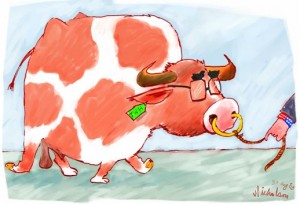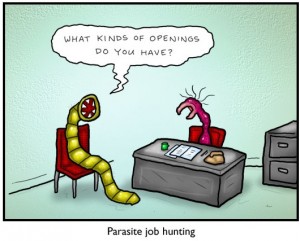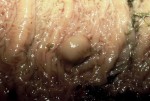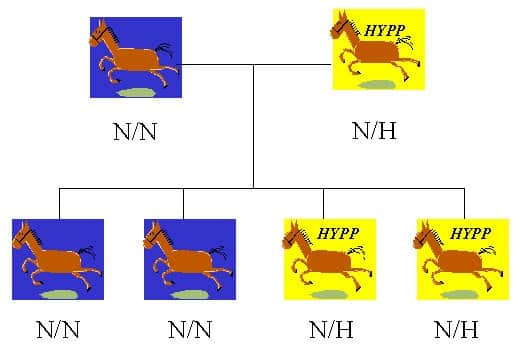OK, I gotta tell you a story. It’s a story that people have forgotten. Long before there were dewormers, horses and internal parasites (worms) got along pretty well. Horses had worms – worms had horses. The horses didn’t benefit from the parasites, but, mostly, they didn’t seem to mind.
Parasites are part of the normal population of organisms that live in the intestines of all grazing animals, like horses. Grazing animals eat where they poop, and the animals, along with their parasites, learned to get along. Horses even developed an immune response in their intestinal lining to help keep the parasites under control. Under this scenario, all was pretty good. Then, people got involved, ![]() and things started to go downhill (for horses and for worms).
and things started to go downhill (for horses and for worms).
When people domesticated horses, horses got stuck in fenced pastures or small boxes. There was nowhere for the horses (or the worms) to go. And the worms – all piled up together in pasture – became more of a problem. People noticed that horses had worms (it’s not hard – kind of gross, actually), and, eventually, people came up with things to kill the worms.* And people were very satisfied that they were doing a good thing, which, to a certain extent, they probably were, because too many parasites can certainly cause a horse harm.**
But, apparently, people forgot that the worms had a say in how the story would turn out. The worms started to develop a bit of a tolerance for the deworming agents, much like, say, someone who goes out to the bars every night. At first, one beer will make a person tipsy – after enough beers, over enough time one beer doesn’t really do anything at all.
Over time, deworming agents stopped working so well. In fact, all the deworming helped select for worms that weren’t killed by the dewormers; the worms that didn’t get killed by the deworming agents started to flourish. Soon, many worms weren’t bothered at all by the dewormers.
 But the people, who had only one thought – WORMS ARE BAD – kept on deworming, because it was easy, fairly cheap, available on every feed store counter. Deworming was in their face. People were told it was the right thing to do, in advertisements, in magazines, on the internet, and by friends at the stable.
But the people, who had only one thought – WORMS ARE BAD – kept on deworming, because it was easy, fairly cheap, available on every feed store counter. Deworming was in their face. People were told it was the right thing to do, in advertisements, in magazines, on the internet, and by friends at the stable.
So today, lots of people deworm lots of horses regularly, and, as a result, there’s a worm population that is becoming increasingly resistant to all of the useful deworming agents known to man. A sad tale, but true.
The moral of the story? There can be too much of a good thing.
OK, with all that behind us, what now?
I’m glad you asked. Here’s what, with the help of Dr. Ray Kaplan, a well-known parasitologist at the University of Georgia.
WHY SHOULDN’T WE BE DEWORMING HORSES EVERY COUPLE OF MONTHS (MINIMUM)?
 Basically, because it doesn’t make sense. The “traditional” approach to deworming, whereby all horses are treated every 2 months or so, was designed in the 1960’s. This program was designed to specifically target a parasite called Strongylus vulgaris, a type of parasite called a large strongyle, which, to be fair, did cause horses some significant problems. Happily, the program pretty much worked. S. vulgaris is now a rare parasite and is practically irrelevant in managed horses. However, the traditional approach fails to address current parasite problems.
Basically, because it doesn’t make sense. The “traditional” approach to deworming, whereby all horses are treated every 2 months or so, was designed in the 1960’s. This program was designed to specifically target a parasite called Strongylus vulgaris, a type of parasite called a large strongyle, which, to be fair, did cause horses some significant problems. Happily, the program pretty much worked. S. vulgaris is now a rare parasite and is practically irrelevant in managed horses. However, the traditional approach fails to address current parasite problems.
WHICH PARASITE IS CAUSING THE BIGGEST PROBLEM NOW?
In managed horses >99% of all eggs are from small strongyles.*** They are called small strongyles because, mostly, they’re smaller than the large strongyles (scientists sometimes have a keen sense of the obvious).
 Small strongyles are actually pretty tame parasites (unlike large strongyles, which can cause some big problems inside a horse’s body). Small strongyles only cause disease when worm burdens reach extremely high levels. Small strongyles almost never cause significant disease in properly managed horses, even if the horses are rarely dewormed. Small strongyles do not migrate in the horse’s body, (unlike large strongyles), nor do they cause permanent scarring, (with the exception of life-threatening burdens, which, again, are rare).
Small strongyles are actually pretty tame parasites (unlike large strongyles, which can cause some big problems inside a horse’s body). Small strongyles only cause disease when worm burdens reach extremely high levels. Small strongyles almost never cause significant disease in properly managed horses, even if the horses are rarely dewormed. Small strongyles do not migrate in the horse’s body, (unlike large strongyles), nor do they cause permanent scarring, (with the exception of life-threatening burdens, which, again, are rare).
Small and large strongyles have very different biology – the traditional approach fails to address the biology of the small strongyles. In fact, the old strategy is an inappropriate strategy, when it comes to small strongyles.
HOW BIG OF A PROBLEM ARE SMALL STRONGYLES?
Adult small strongyles cause no recognizable problem for horses, however, their larvae can sometimes be trouble. The 4th stage larvae are encysted, that is, they live in a little capsule, called a cyst. When the larvae come out of their cysts, this can cause occasionally cause sudden weight loss, often with severe diarrhea, in some horses.
SO WHAT SHOULD I DO ABOUT THE LARVAE?
Well, don’t just keep doing what you’re doing. Many deworming treatments do not even kill small strongyles. Drug resistance highly prevalent in these  worms. The only reason you don’t realize that you’re deworming strategy is probably not doing any good is because most of the horses you are treating did not need the treatment in the first place.
worms. The only reason you don’t realize that you’re deworming strategy is probably not doing any good is because most of the horses you are treating did not need the treatment in the first place.
While your dewormer may not be killing the adults, none of the single dose deworming treatments (except moxidectin) kill the encysted stages. So, if you’re giving your horse a single dewormer all the time, you are only, at best, killing the stages that cause the least problems. However, once the adults are gone, it just encourages their replacement by encysted larvae, which is the bigger problem.
I’M WORRIED. CAN I AT LEAST CHECK AND SEE IF MY HORSE HAS SOME PARASITES?
Sure. You can use fecal egg counts (a fecal exam) to see if your horse has parasites. Fecal egg counts aren’t always accurate – if there are eggs, there are parasites in your horse, but sometimes there are parasites and no eggs – but fecal tests are useful screening devices, especially when you’ve got a number of horses together. If you’ve got a herd of horses to manage, using Fecal Egg Count Reduction Tests (FECRT) can be helpful.
COUNTING TECHNIQUE, ALSO USED IN FECAL EXAMS
But even if your horse has some parasite eggs, there is absolutely NO evidence (nada, zero, zilch) whatsoever that treating a horse with a low fecal egg count does anything beneficial for the horses health. Maybe, if you’ve got horses in pasture, you deworm once or twice a year to cover other parasites, like bots, or tapeworms (which are extremely uncommon in southern California) but that’s probably all you need to do.
WHY SHOULDN’T I JUST KEEP DEWORMING? I MEAN, IF MY HORSE HAS PARASITES, I’M GOING TO DEWORM HIM ANYWAY, RIGHT?
Well, if you’ve gotten this far, I sure hope not. Like I said, too frequent deworming promotes drug resistance. As a result, we are running out of effective dewormers. For example, resistance in small strongyles is very common against the benzimidazoles (e.g. Panacur®) and pyrantel (e.g., Strongid®), and it is emerging for ivermectin (e.g., Zimectrin®) and moxidectin (e.g., Quest®). And there are no new dewormers for horses in the pipeline.
It will be many years before we have a new drug for deworming horses (or any other animals). If people keep acting like sheep, and deworming their horses too often, we likely will soon be in a situation where we have nothing left that is effective. And, when we finally do get a new drug, it may not be very effective for very long if people don’t learn some lessons and change their behaviors.
OK, BUT OTHER THAN THAT, WHAT’S THE PROBLEM?
 Recent deworming is a risk factor for the rare disease larval cyathostomiasis, which is a serious life threatening disease. And contrary to common belief, treatment does nothing to prevent the disease. Only prevention of high transmission can prevent this disease. And the only way to prevent high transmission is to perform fecal egg count surveillance and treat the high shedders with drugs that work and use good pasture management.
Recent deworming is a risk factor for the rare disease larval cyathostomiasis, which is a serious life threatening disease. And contrary to common belief, treatment does nothing to prevent the disease. Only prevention of high transmission can prevent this disease. And the only way to prevent high transmission is to perform fecal egg count surveillance and treat the high shedders with drugs that work and use good pasture management.
PASTURE MANAGEMENT? YOU MEAN THERE’S SOMETHING ELSE WE CAN DO BESIDES SHOVE DEWORMERS DOWN OUR HORSES?
Bingo.
People create problems for horses with poor management when they fence animals and overstock pastures, forcing them to graze in the roughs close to the feces. Parasite problems are a management issue! CLICK HERE for a great paper on how to reduce environmental contamination.
BUT I LIVE IN SOUTHERN CALIFORNIA. MY HORSE WOULDN’T KNOW WHAT A PASTURE LOOKED LIKE IF IT CAME UP AND BIT HIM IN THE BACKSIDE.
 Exactly. And that’s just the worst thing possible, if you’re a parasite. Instead of getting pooped out into nice, grass, where you’ve live cycle can continue, you end up in hot, dry sand. Southern California is parasite hell. Plus, your horse’s manure probably gets cleaned out all the time (I mean, assuming that you take care of him), so there’s even less chance of parasite transmission. The environmental factors for most horses in southern California make significant parasite problems very unlikely.
Exactly. And that’s just the worst thing possible, if you’re a parasite. Instead of getting pooped out into nice, grass, where you’ve live cycle can continue, you end up in hot, dry sand. Southern California is parasite hell. Plus, your horse’s manure probably gets cleaned out all the time (I mean, assuming that you take care of him), so there’s even less chance of parasite transmission. The environmental factors for most horses in southern California make significant parasite problems very unlikely.
ANY FINAL WORDS?
I think I’ll stop here. The bottom line is that we know that the old traditional approach makes no biological or medical sense in 2012, and frequently fails to provide good parasite control. We don’t know what the best approach is for all horses, but we do know what approach makes sense – do periodic fecal exams, and deworm only when the horse has a significant fecal egg count. These recommendations might change – all medical practices should change over time as more and better knowledge/evidence is gained. But for now, and especially if you live in southern California……
STOP DEWORMING YOUR HORSE SO OFTEN!
Dr. Kaplan wrote a great article about current thoughts on deworming practices in 2010. CLICK HERE to read it.
In 2013, the American Association of Equine Practitioners released their parasite control guidelines. CLICK HERE to read them.
************************************************************************
* Sometimes, the deworming products killed horses, too, especially when the horses were getting products like tobacco, an early deworming agent, or, later organophospate chemicals.
** I mean, the best way to take care of the problem would have been to let the horses out and start grazing the range again, but that wasn’t an option. The range for horses is gone, replaced by things like the 210 freeway (or the Autobahn – regional rules apply). Plus, it’s hard to keep your horse on millions of acres and still catch him in time for your 8:23 a.m. 2nd level dressage test.
*** Scientists call small strongyles, “Cyathostomes.” I wouldn’t dream of making you try to say such a word. I have trouble with it.











